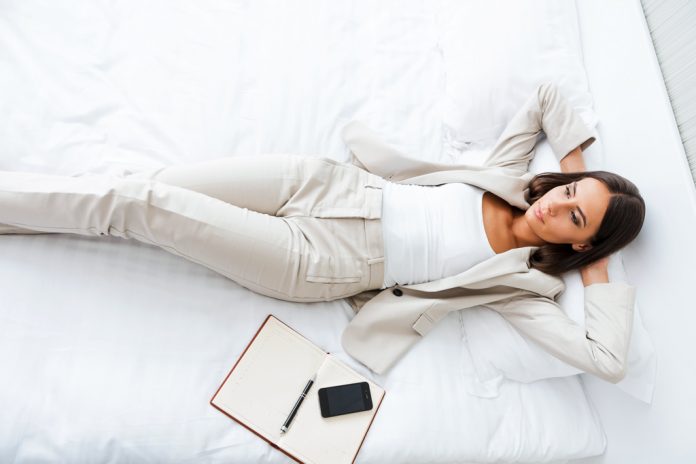Entrepreneurs are some of the busiest people in today’s world and many business owners are trying to figure out how to sleep better. Competitive business landscapes and the demands of creating the best working environment for employees can lead to sleepless nights for some of the biggest changemakers in the corporate world.
If this is you, there is something you need to know: the cycle of sleep-deprived nights and burning out in the day is counterproductive.
It’s widely known that sleep deprivation negatively impacts our health and decision making. For an entrepreneur, fast, efficient, and creative decision making can make or break a company.
It might be helpful to know that some of the world’s most successful entrepreneurs are sleeping well. Amazon Billionaire Jeff Bezos locks down 8 hours of shut-eye each night. Bill Gates ensures he gets at least 7 hours.
So the billion-dollar question should be: how to sleep better when you have a busy schedule?
How do people achieve an overwhelming list of tasks, and still dedicate one-third of the day to bed?
It’s simple. First, you need to believe that quality sleep is essential. Second, just like all essential tasks, you need a plan to create a tailored sleep routine that aligns with a jam-packed schedule, like that of an entrepreneur.
The Science of Sleep
There are times when conversations about sleep can feel like hearsay. We all know someone who claims that 4 hours is all they need. This may be the case for specific stages of life. However, it’s not sustainable.
In analyzing the stages of sleep, it becomes quite clear why a lack of sleep is not a good long-term game plan. There are four stages of sleep. The first three stages are called NREM (non-rapid eye movement sleep) which is when the body prepares for deep sleep. The fourth stage is REM (rapid-eye-movement sleep); this is the stage of high brain activity and immobility of the body for deep relaxation.
What do the stages of sleep mean?:
- Stage 1 (NREM): when you transition from being awake to falling asleep (this stage of sleep lasts for around 10 minutes)
- Stage 2 (NREM): When body temperature drops and the heart rate slows (this stage of sleep lasts for 20 minutes
- Stage 3 (NREM): Muscles relax, and the deepest sleep occurs
- Stage 4 (REM): High brain activity deep relaxation (this stage of sleep usually lasts for 1 hour)
An average adult should experience five to six cycles of sleep. Skipping sleep means you are not allowing your mind and body to experience the complete sleep cycle. As a result, your mind and body can react by expressing pain, drowsiness, irritability, and a general feeling of exhaustion.
If you are an entrepreneur or just anyone who wants to sleep better, it’s important to know that successfully completing the sleep cycle is the reason why doctors and sleep specialists always recommend between 7-8 hours of sleep per night.
A How to Sleep Better Guide for Entrepreneurs
Sleeping well and being highly-productive co-exist. That feeling of completing an impressive list of tasks is fulfilling. However, waking up fresh, rejuvenated, and excited to tackle a new day is an even better feeling.
Busy entrepreneurs who sleep well tend to have similar habits. The guide below can help you create a rewarding sleep routine.
Create a Sleep Schedule
Schedule your sleep like a meeting. Add it to your calendar if necessary. Creating a level playing field between rest and work will allow sleep to be as front of mind as your other tasks. Furthermore, adding 7-8 hours of sleep to your daily schedule can supercharge your time management and reduce procrastination until late into the night.
Meditate and Relax the Mind
Twenty minutes of daily meditation is proven to help increase alertness and eliminate unnecessary late-night rumination. If you are wondering how to fall asleep quickly and meditation isn’t your thing, also consider listening to deep relaxing sleep music. Calming sleep music relaxes the mind in preparation for the sleep cycle.
Sleep on a Cooling Mattress
Once you have created a schedule for sleep, and have relaxed your mind to fall asleep faster, pay attention to the temperature of your bedroom. A hot, stuffy room can make falling asleep and staying asleep problematic.
The type of mattress you are sleeping on is critical to the quality of sleep you get. Hot sleepers should try sleeping on a cooling mattress such as a memory foam mattress. Cooling mattresses are designed to work together with the temperature changes in your body. When the seasons change, a cooling mattress will ventilate air so you don’t overheat.
Memory foam is widely regarded as the best mattress for breathability and temperature regulation due to its porous nature. If you find yourself sleeping hot, or waking up regularly, it might be time for a mattress upgrade.
Eat Foods That Help You Sleep
Just as much as productivity and sleep are allies, so too is diet and digestion. A healthy digestive system creates more energy in the day and deeper sleep patterns at night. Many digestive issues arise when there’s yeast overgrowth, but this doesn’t mean you have to kill off all yeast. Instead, you can take probiotics that feed the digestive system with the nutrients it requires to be able to maintain a healthy balance with the yeast. This way you’ll be improving your overall health, not just your sleep.
If you’re seeking better sleep, the following foods can help:
- Prunes – great for the release of melatonin
- Herbal teas – calming and soothing for the stomach
- Dark chocolate – naturally packed with serotonin
- Bananas – potassium relaxes the muscles
- A few pistachios – packed with protein (refrain from creating a mountain of shells!)
By prioritizing sleep, relaxing the mind, focusing on your mattress, and eating the right foods, even the busiest people in the world can get adequate sleep. Sleep more and watch your productivity skyrocket!
Find a Home-Based Business to Start-Up >>> Hundreds of Business Listings.

















































